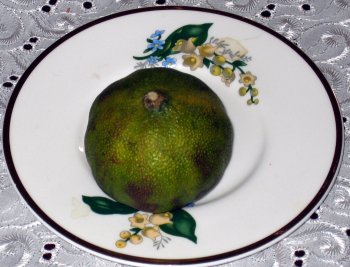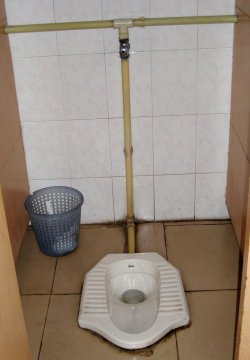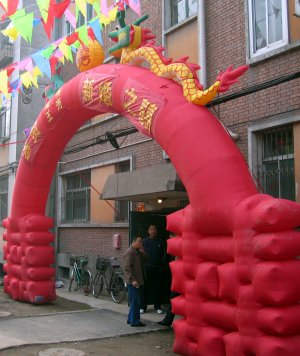
I’m lucky enough to have a fiancee who isn’t too excited about weddings so we’ll most likely be skipping our Chinese wedding. But I’ve looked at quite a few wedding albums (not much else to do when you visit friends you can’t understand) and weddings are pretty hard to miss on the street since they involve prodigious amounts of fireworks, giant inflatable gates and extremely amplified live (well a token singer and some sort of trombone or piano along with a recorded track) bands. From what I gather, the process of a Chinese wedding is quite different from Western ones so I thought I’d try to detail it:
- Several months earlier the groom and bride (without any parents or friends) take their wedding photos in a sort of wedding photo factory. I actually did this one so I’ll detail it later.
- At midnight the groom’s family lights off fireworks.
- Around 7 in the morning, the groom leaves the groom’s parents’ house (actually usually an apartment) in a car covered in roses. As many of his friends as possible borrow fancy black cars (at least 6 or so) from their work (apparently every company and bureau must have a stock of fancy black cars for weddings and official visits) and form a big caravan. The groom and his friends but not his parents or siblings drive away. More fireworks are launched.
- The groom arrives at the bride’s parents house. More fireworks are launched and a band plays. The bride’s parents lock the door and don’t let the groom in until he slips numerous red envelopes filled with cash through the door. The groom and his friends finally get in and then find the bride waiting in her bed without shoes. More red envelopes of cash and lots of searching are required before the shoes appear. Then the couple gets to bow to all the uncles, aunts, siblings and parents of the bride. The relatives pay the groom red envelopes and in return he calls each one by their new relationship. Then the groom carries the bride to the caravan of cars through sprinkles and silly string. More fireworks ensue.
- The groom’s caravan arrives back at the groom’s parents’ house. More fireworks are launched and the band (that drove over early) plays again. Sometimes the band manages Here Comes the Bride and sometimes they play songs more appropriate for sporting events. The groom carries the bride up to his parent’s house through more silly string. The couple bow to all the groom’s relatives and the bride calls them by their new relationship in exchange for more red wrapped money. Then one of the bride’s friends brings in a suitcase with blankets and some money in it from the bride’s family. They make a big deal about counting the money and then the groom’s parents have to put in double the amount.
- The bride changes from (typically) a Western-style (although not necessarily white) dress to a Chinese-style (usually red) dress. The groom’s entire group and the bride go to a restaurant where they are joined by more distant friends of the groom. Each guest has to sign in and give money (in a red envelope) which is counted and recorded. The bride and groom spend the whole time walking around pouring a drink for each and every guest and receiving congratulations one by one.
- In the evening, there is a sort of combined bachelor/bachelorette party involving alcohol, cucumbers, apple pies and/or ropes (I’m a little sketchy on the details) and making the new couple feel nice and uncomfortable before they are finally left alone for the night (often still at the groom’s parents house).
- The next day the bride and groom go visit the bride’s parents and go to lunch with the bride’s family and friends. Again guests sign in and their gifts of money are counted and recorded. The couple again spend a few hours going from guest to guest pouring drinks.
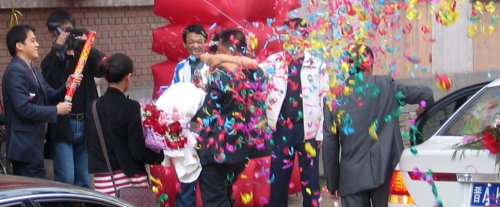
That’s about it. I’m sure these things vary but I think those are the normal bits. I found it interesting that there was such emphasis on money in a Communist country and that the bride’s and groom’s friends and relatives don’t mix (I guess Chinese wedding crashers don’t have much luck). Also the fireworks really give you a feel for how many weddings occur since you can hear them from all over the city. During Golden Week (a week long break for national day), there seemed to be a wedding every few minutes for the whole week.
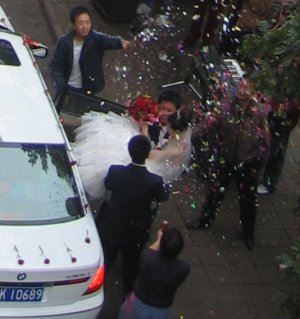
Interestingly, all these customs have redeveloped rather recently since the previous generation discarded it all with the Cultural Revolution. For example, Xiaofen’s parents were married before they ever met. They wrote letters to each other and somehow her mom knew her dad wanted to get married although they apparently never wrote it out. So she got a friend in the wedding office to skip the groom’s signature part and issue them a certificate. I asked them what they said to each other when they finally met but unfortunately they don’t remember.
As for us, I suggested we skip the bowing and pouring drinks and keep the fireworks, band and driving around in a caravan. Xiaofen’s parents suggested we skip the fireworks, band and driving and just do the bowing and pouring drinks. Xiaofen didn’t want to do any of it because she saw what a pain the bowing and pouring was at her sister’s wedding (and I guess it’d be worse with a groom that can’t speak), she feels silly having a caravan pick her up, go around the block and come back to her place (I suppose she does have a point) and she feels bad getting money from everyone and then not going to their weddings. So we ended up not doing any of it. Kind of a shame since, to tell the truth, I was actually kind of curious to try it out.



